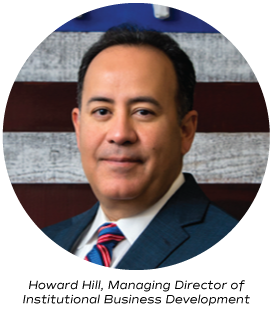 Today’s guest post is written by Howard Hill, Managing Director of Institutional Business Development at ClaraPHI Advisory Network, LLC. Howard has more than 30 years of experience in the financial services industry as a consultant, advisor, corporate business development and national strategic partnership executive, private equity investor, real estate investor/developer, and venture capitalist.
Today’s guest post is written by Howard Hill, Managing Director of Institutional Business Development at ClaraPHI Advisory Network, LLC. Howard has more than 30 years of experience in the financial services industry as a consultant, advisor, corporate business development and national strategic partnership executive, private equity investor, real estate investor/developer, and venture capitalist.
Diversification is a key strategy, and especially so during periods of unpredictable daily market swings.
To ride out the market volatility we are experiencing during the coronavirus pandemic, investors are pivoting away from traditional stocks, bonds, and equities and turning their attention toward alternative investments that could stabilize their portfolios over the long haul.
Accredited investors and their advisors are looking more closely at alternative investment instruments with long-term horizons such as hedge funds, REITs, and Qualified Opportunity Zone Funds (“QOZF”s).
Let me tell you why: 
Alternative investments can balance out the overall investment portfolio
Although some active traders may have the nerves and experience to conduct trades during a volatile market, this view is more tactical rather than a long-term strategic play. Most investors invest for a strategic purpose; plus it is a riskier proposition to attempt to time all the market swings about to come our way.
Especially now, the market calls for a strategic long-term investment strategy that aims to mitigate risk and maximize future returns. Proper positioning of accredited investor portfolios should include consideration of their individual goals, time horizons and risk profiles. For some of these investors with longer term horizons, QOZFs may be a useful tool in the overall asset allocation.
Alternatives are illiquid, and that can provide stability in periods of volatility
Yes, investors’ money is locked up longer in an alternative investment like QOZFs. But given long-term horizons, they are insulated from day-to-day market fluctuations, and that can make them a useful diversification tool.
Of course, there’s also the tax advantage. Capital gains rolled over to QOZFs grow tax-free for investors who hold it for at least 10 years. That’s not to say benefits won’t flow to investors until 10 years out. A successful QOZF distributes cash to investors along the way as it grows and develops its projects.
Alternatives are a long-term play that align with our firm’s long-term investment philosophy. For independent investment advisors, the 10-year fund timeline also provides for a longer term working relationship with their clients.
Looking forward...
Even after the crisis subdues, I believe there will be a flight to hard assets and alternatives versus market-based assets. In general, when the stock market goes down as it has in recent months, a client’s standard of living will likely decline too. A real estate-based asset that declines may still provide clients with cash flow.
I’d be remiss if I didn’t mention the possibility that economic fallout from the pandemic might change the existing real estate dynamic. High density environments may not be as favorable and the working-from-home habit might become the norm, reshaping the design for big office complexes.
However, real estate will remain a tangible, valuable hard asset, and instruments like REITs and alternative investments such as QOZFs are a potentially excellent long-term investment option to be considered by advisors for proper clientele.
Have more questions? Contact us today!
Howard Hill is an investment adviser representative of Claraphi Advisory Network, LLC, an SEC-registered investment adviser. This blog is for informational purposes only. No solicitation to buy or sell securities is being made by this blog. All investments carry risk and investors should consult with their own tax advisor.


